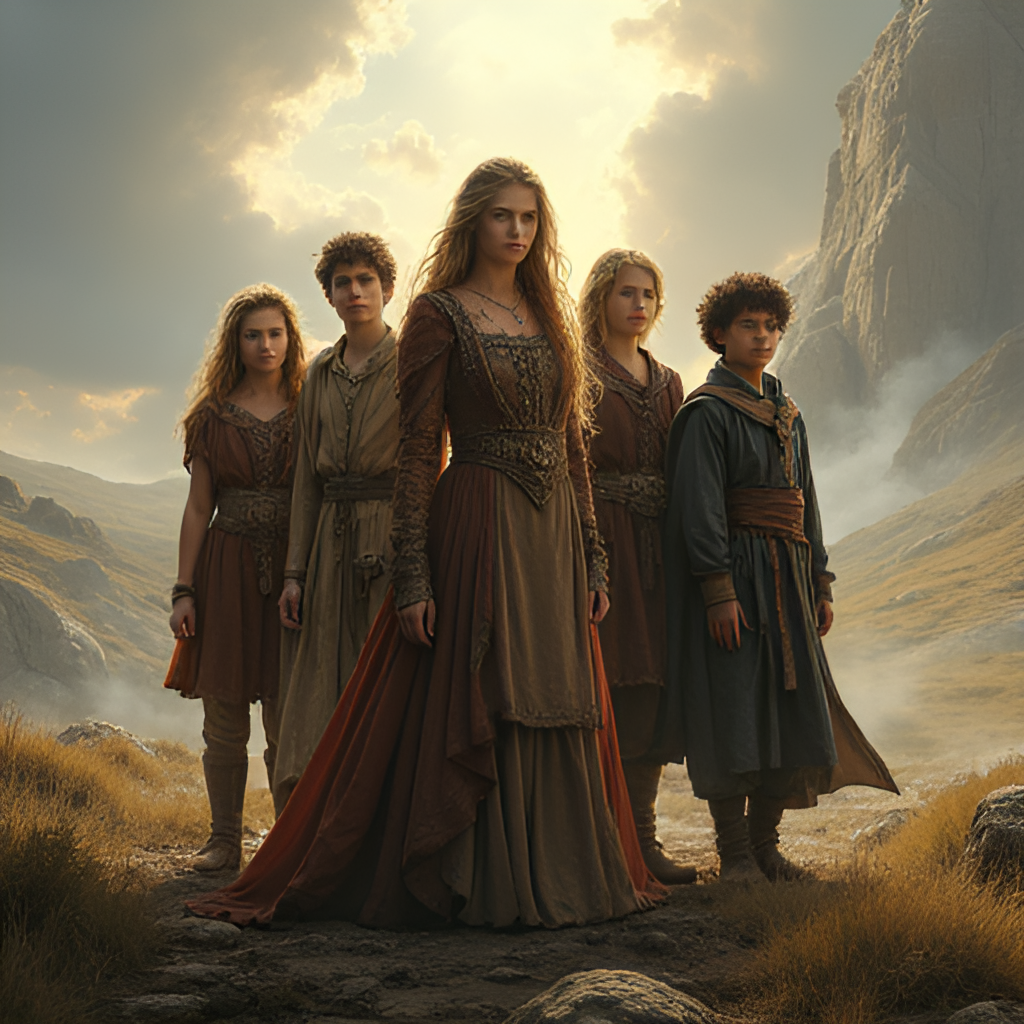Wheel of Time Prime Video Cancellation: Unpacking the Shocking News
- The Unfortunate Reality of Wheel of Time Prime Video Cancellation
- Why the Wheel Stopped Turning: Reasons for Cancellation
- The Fandom Responds: Disappointment and Disbelief
- Adapting the Untamed River: The Book Series vs. the Show
- Is There Hope? The Future of the Wheel of Time Story
- Reflecting on the Wheel of Time Prime Video Cancellation
The Wheel of Time Prime Video cancellation has sent ripples of shock and disappointment through the fantasy community. As a long-time reader of Robert Jordan’s epic saga and someone who eagerly anticipated its transition to the screen, hearing about the show’s abrupt end after just three seasons feels like a punch to the gut. Just when it seemed like the series was finding its stride, delivering a critically acclaimed third season, the news broke that Prime Video would not be moving forward with Season 4. It leaves many of us wondering, “Why?” and “What comes next?”
For years, fans of The Wheel of Time books dreamed of a faithful, high-budget adaptation that could capture the sprawling scope and intricate detail of Jordan’s world. Prime Video stepped up to the plate, promising a flagship fantasy series that would stand alongside other giants of the genre. The initial announcement and the lead-up to the premiere generated significant buzz, positioning the show as a potential successor to the likes of Game of Thrones. I remember the excitement palpable within online communities as trailers dropped and casting news emerged. It felt like a new age for Rand, Mat, Perrin, Egwene, and Nynaeve was dawning on screen.
Season 1 premiered in November 2021 and, while met with mixed reactions from book purists regarding its deviations from the source material, it performed well for the streamer, becoming Prime Video’s most-watched series premiere of that year and one of its top five series launches of all time . This early success seemed to bode well for the show’s future, and Prime Video quickly renewed it for a second season even before the first had finished airing. Season 2 arrived in September 2023, continuing the journey and, in my opinion, improving upon the first season in several key areas, particularly in character development and pacing. The momentum seemed to be building.

This image is a fictional image generated by GlobalTrendHub.
Why the Wheel Stopped Turning: Reasons for Wheel of Time Cancellation
So, why the sudden stop? The primary reason cited for the Wheel of Time Prime Video cancellation is financial. High-budget fantasy series are incredibly expensive to produce, with massive costs associated with world-building, visual effects, large ensemble casts, and intricate costumes and sets. While Amazon executives reportedly liked the show creatively, the viewership numbers, particularly for Season 3, did not justify the significant investment required for future seasons.
Sources indicate that Season 3, despite receiving positive reviews and a high Rotten Tomatoes score from critics (97% ), saw a drop in viewership compared to previous seasons, falling out of Nielsen’s Top 10 Originals chart after just three weeks in the US market. This is a critical metric for streaming services, as it directly impacts advertising revenue and subscriber retention. While the show reportedly performed better globally and even ranked number one in some countries, the overall performance wasn’t strong enough to secure its continuation in the current economic climate for streaming platforms.
The sheer scale of Robert Jordan’s fourteen-volume book series also presents a unique challenge. Adapting such a vast narrative requires a long-term commitment, potentially spanning many seasons. Given the high production costs per season, the total investment needed to tell the entire story is monumental. In a streaming landscape that is increasingly focused on profitability and sometimes shorter, more impactful series, a multi-season epic like The Wheel of Time might be seen as a riskier long-term bet, especially if viewership isn’t consistently hitting blockbuster levels. It’s a tough reality, but the economics of television production, particularly in the streaming wars era, are unforgiving.
The Fandom Responds: Disappointment and Disbelief Over Prime Video’s Decision
Predictably, the announcement of the Wheel of Time Prime Video cancellation has been met with significant disappointment and, in many cases, outright disbelief from the show’s dedicated fanbase. On social media and fan forums, the reaction has been swift and emotional. Many fans feel that the show was just starting to hit its stride creatively, especially with the positive reception to Season 3. They point to the show’s potential, the vast untapped source material, and the loyal global following it had cultivated.
I’ve seen countless posts from fans expressing their sadness that they won’t get to see the rest of the story unfold on screen. There’s a sense of frustration that a series based on such a beloved and expansive literary work won’t receive a proper conclusion. It’s a feeling I share. As someone who has spent countless hours immersed in Jordan’s world, the thought of the television adaptation ending prematurely is genuinely disheartening. It leaves so many plot threads dangling and character arcs incomplete. The show only managed to adapt roughly the first five books of the fourteen-volume series , leaving a vast amount of story untold.
Some fans are already discussing potential campaigns to save the show, hoping that another network or streaming service might pick it up. While this is a common reaction to beloved shows being cancelled, the reality is that the high production costs make it a challenging prospect. Still, the passion of The Wheel of Time fandom is undeniable, and their vocal response highlights just how much the show meant to them. It underscores the deep connection viewers can form with fantasy worlds and characters they care about. It’s a testament to the power of storytelling, even when the journey is cut short.

This image is a fictional image generated by GlobalTrendHub.
Adapting the Untamed River: The Book Series vs. the Show
One aspect that has always been a subject of discussion among fans is the show’s adaptation choices. Robert Jordan’s Wheel of Time series is known for its intricate plotting, massive cast of characters, and deep dives into world-building and magic systems. Translating such a complex narrative to a visual medium with time constraints is an immense challenge. Showrunner Rafe Judkins and his team made conscious decisions to streamline certain plotlines, alter character introductions, and shift perspectives, which sometimes led to divisions within the fanbase.
Some book readers felt the show strayed too far from the source material, simplifying complex themes or altering character motivations. Others appreciated the need for changes to make the story work for television and praised the show for its visual spectacle and strong performances, particularly from Rosamund Pike as Moiraine Damodred. My own perspective is that adaptation is a delicate balancing act. While I missed certain elements from the books, I also understood that a direct page-for-screen translation of every detail would be impractical, if not impossible, for television.
The sheer length and density of the book series meant that even three seasons only covered a fraction of the overall story. This brings us back to the core problem exacerbated by the wheel of time prime video cancellation: the story feels unfinished. The third season was based on elements from the fourth book, “The Shadow Rising” , widely considered one of the best in the series and a point where the narrative significantly expands. To end the adaptation here leaves viewers who haven’t read the books on a massive cliffhanger, with many major plot threads unresolved and the central conflict far from its conclusion.
“The Wheel of Time has stopped turning on Prime Video after Amazon canceled the series following the end of Season 3.”
— IGN
This abrupt halt underscores the challenges of adapting such a monumental work in the current television landscape, where even popular shows aren’t guaranteed to run for their full narrative potential if the economics don’t align. It’s a reminder that even with creative success and a passionate fanbase, the financial realities of big-budget streaming can dictate a show’s fate.
Is There Hope? The Future of the Wheel of Time Story Beyond Prime Video
With the unfortunate news of the wheel of time prime video cancellation, fans are naturally looking for any glimmer of hope for the future of the story on screen. As mentioned, there’s always the possibility, however slim, that another platform could step in to rescue the series. However, the significant production costs remain a major hurdle. It would likely require a streamer with deep pockets and a strong commitment to the fantasy genre, perhaps even one looking for a proven IP to boost subscriptions.
Another possibility that has been raised is completing the story in a different format. Could the remaining books be adapted into a series of movies? Or perhaps animated features? While less ideal for capturing the granular detail of the books, these formats might offer a more financially viable way to bring the narrative to a conclusion. For instance, an animated series could potentially reduce some of the live-action production costs associated with elaborate sets and visual effects.
For now, the most reliable way to experience the full story of The Wheel of Time remains through Robert Jordan’s original novels (and the conclusion written by Brandon Sanderson). The books offer the complete, in-depth journey that the show could only begin to explore. If you’re feeling frustrated by the lack of closure from the series, diving into the books is the best path forward. They are a monumental achievement in fantasy literature and provide the rich, detailed narrative that captivated millions of readers for decades.
Ultimately, the future of The Wheel of Time on screen is uncertain following the cancellation. While the current television adaptation has ended, the world and its characters are so rich and beloved that it’s hard to imagine this is truly the end of the story’s visual journey forever. Time will tell if the Wheel weaves a path for a new adaptation or continuation in the years to come. For now, fans can revisit the existing three seasons on Prime Video and, more importantly, delve into the fourteen incredible books that started it all.
Reflecting on the Wheel of Time Prime Video Cancellation
The announcement of the Wheel of Time Prime Video cancellation is undoubtedly a disappointing moment for fans and everyone involved in the show’s production. It serves as a stark reminder of the economic realities that can impact even critically praised series in the competitive streaming landscape. While the show had its challenges and sparked debates among book readers, it also brought a beloved fantasy world to life for many viewers and garnered a dedicated global audience. The end of the series after only three seasons leaves a vast, unfinished story on screen, a frustrating outcome for those who invested their time and passion in the adaptation.
Looking back, The Wheel of Time’s journey on Prime Video was a ambitious undertaking. It attempted to compress a colossal literary saga into a television format, facing the inherent difficulties of balancing fidelity to the source material with the demands of visual storytelling and episodic structure. While the series may have concluded prematurely due to financial considerations, its existence brought new fans to Robert Jordan’s incredible world and provided moments of genuine fantasy spectacle. The legacy of the Wheel of Time Prime Video cancellation will likely be one of an ambitious project cut short, leaving fans to return to the pages of the books to find the completion they sought on screen. It’s a tough lesson in the business of fantasy adaptations, but the Pattern of the Wheel continues to turn in the hearts and minds of its many readers.